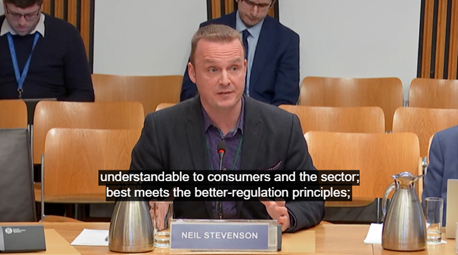Scottish Legal Complaints Commission on RoLS Act

In 2007 when the legislative debate which set up the Scottish Legal Complaints Commission took place, stakeholders and politicians were focused not just on creating an accessible complaints scheme for legal service users, but in detailing the specific processes and procedures the organisation would use in dealing with those complaints.
That led to founding legislation which is complicated and overly prescriptive, and which has been the subject of significant debate and legal challenge ever since. The impact of that on the organisation and complaint parties is significant.
Fast forward ten years and we – and others – were calling for government to reform the legislation governing legal services regulation and complaints to make it fit for purpose and today (and tomorrow’s) consumers and legal services market.
In making the case for that reform we were able to draw on all our years of experience in resolving complaints, working with the sector to improve complaint handling and understanding consumer needs and expectations. We were also very fortunate to be able to draw on insight, learning and approaches from across the ombudsman sector. We are very grateful to everyone who spoke to us or who shared insight at Ombudsman Association meetings and conferences. Being able to point to live examples helped to reassure parliamentarians about the changes we were proposing and saw many of them adopted in the final Act.
It's fair to say that the last decade of debate, consultation and legislative scrutiny hasn’t always been plain sailing. But the strength of argument about what a complaints scheme should be and do in order to reduce consumer detriment and drive improvement in services has been our touchstone. You can watch our Chief Executive, Neil Stevenson giving evidence about that in the Scottish Parliament, alongside former SPSO ombudsman, Rosemary Agnew.
That has helped us to win significant improvements to the flexibility and proportionality of the service we will be able to provide. It also helped us to protect our independence, a key cornerstone of our membership as a complaints handling member of the OA.
The SLCC is unusual in that, alongside its complaint handling role, we also have powers to oversee the professional regulators’ complaint handling and redress functions. Those powers have also been expanded and strengthened through the new legislation. As have the powers of our independent consumer panel, which will have a remit across the regulatory sector, bringing consumer voice, insight and advocacy to regulatory debates.
With the Regulation of Legal Services (Scotland) Act 2025 now passed into law, our focus has turned to implementation. As any organisation which has reformed their complaints process will know, making substantive changes to a process while keeping business as usual running is no mean feat. But we have a strong track record in using agile approaches to implement change and our staff team are up for the challenge. It also helps that many of the changes we asked for drew on pain points they see in their day-to-day work!
If there are organisations reading this who are considering or going through legislative change, we’d gladly share our experience. Being an OA member has certainly helped us on this journey, and we’d be very happy to repay the favour.
Alongside the usual steps of influencing parliamentary debates some key practical things we felt made a difference were:
- using diagrams and visualisations (for example a diagram of the ‘complaints maze’ facing consumers) – great for influencing policy makers
- being willing to be critical of our current legislation – saying something is ‘broken’ gets more attention than ‘room for improvement’
- aiming high – we didn’t get everything we asked for, but being bold opened up more space for discussion than starting with a request for a few amendments
- drawing on existing drafting in other legislation, defeating arguments that something is not possible, legal or appropriate
- referencing government policy (better regulation principles) and internationally agreed principles (e.g. Venice Principles)
- setting a high-risk appetite – our Board understanding we had to take risks in the debate if we were going to get meaningful change
- supporting our consumer panel to voice strong views about user experience in complaints systems
- using case studies to show how real lives were affected by poor legislation
- playing the long game – persistent pressure when government were showing an interest, and in periods they were not.
Please do get in touch if you’d like to know more!
Vicky Crichton, Director of Public Policy, Scottish Legal Complaints Commission
